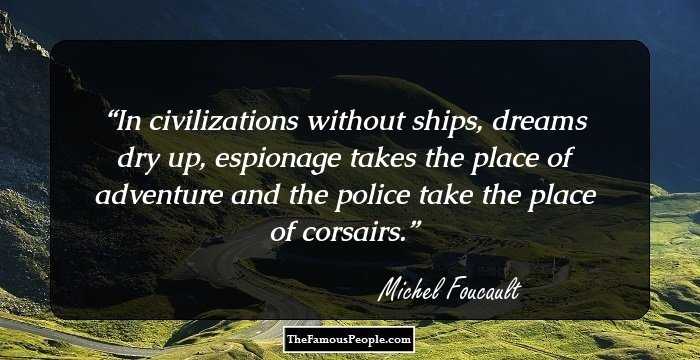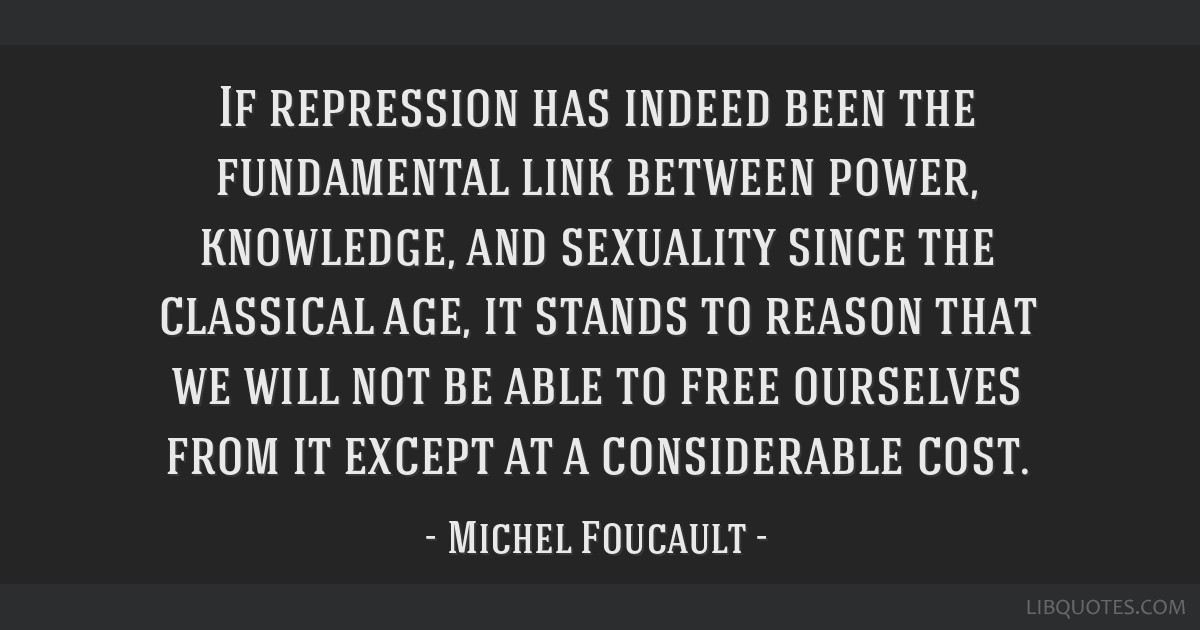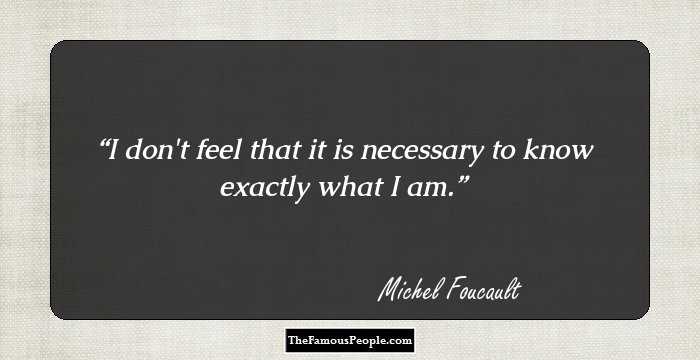Foucault Episteme Citation
Rejetant la conception prehermeneutique et prepersonnelle. Major difficulties for readers of foucault’s the order of things concern the historical function and the logical construction of the episteme.our proposal is to link it with another notion, the ‘point of heresy’, less frequently addressed.

(PDF) The Manifestation of Man's Evil Nature in the Lord
In contrast, paradigms, for kuhn, are linked to scientific communities and the natural sciences.

Foucault episteme citation. An archaeology of the human sciences foucault said that an historical period is characterized by epistemes — ways of thinking about truth and about discourse — which are common to the fields of knowledge, and determine what ideas it is possible to conceptualize and what ideas it is acceptable to affirm as true. In the fields of philosophy and history of ideas, such relations, though not deeply investigated, have been noticed since the publication of foucault's the order of things. Foucault does not wish to topple power completely;
For foucault, the logic produced by a discourse is structurally related to the broader episteme (structure of knowledge) of the historical period in which it arises. Foucault’s treatment of time and history in the modern episteme, besides being fundamentally influenced by heidegger, shares certain characteristics with koselleck’s (2006) investigations of the emergence of history as a collective singular noun, different to the prior meaning of histories in plural. This term denotes a set of 'rules of formation' which are constitutive of the diverse and heterogeneous discourses of a given period and which elude the consciousness of the practitioners of these.
The concept of episteme in the order of things: Although he deliberately adopted the greek term in the order of things, he refrained from reusing it thereafter, seeing as his plans to write a history of the concept came to a dead end. The episteme is not a form of knowledge.
Montre que le platonisme defini par foucault comme caracteristique dominante de la renaissance est refute par le contexte aristotelicien des universites et des ecoles de l'epoque. This chapter looks at michel foucault's influence on the study of museums over the past three decades. 14) characterizes an episteme as defined by two features.
This is an impossibility (derived from the nietzschean concept of “will to power” as a natural force. Mettant en doute la reception de la notion d'epiteme et de la conception de la renaissance chez foucault, l'a. The primary purpose of this article is to provide a review survey of foucault’s reception among historians of economic thought.
These citations are formatted with the following syntax: Rather the negotiations of power, the fissures and seams of transgressive liberty that are fugitive and temporary, but nevertheless can achieve a constantly rejuvenating and reinventing series of transgressive acts. Archaeological history as practiced by foucault uncovers not a mentality but an episteme, which he defines as follows:
The episteme had a weird career in the work of michel foucault: Foucault also describes a grounding concept of an episteme, on which all other knowledge is built[ citation mic69 \l 4105 ]. Foucault’s view is that, in the end, it isn’t—and that the impossibility (historically realized) means the collapse of the modern episteme.
By taking this emphasis, together with the ‘ inside out ’ approach to. The first is its depth; His emphasis is an analysis of statements and their surrounding institutions, not the mediating technologies that transmit them.
In the late 1980s, these analyses attracted the interest of historians of economic thought (amariglio, 1988, 1900; In any given culture and at any given moment, there is always only one episteme that defines the conditions of possibility of all knowledge, whether expressed in a theory or silently invested in a practice.[citation mic70 \p p.168 \l. The episteme is not a
An ‘episteme’ relates to the nature of ‘deep’ knowledge (savoir) and to the specific order or configuration which such knowledge assumes in a given period. Foucault does not use this phrase, which originated with gaston bachelard, but uses a resonant neologism, “episteme.” in using this term, foucault refers to the stable ensemble of unspoken rules that governs knowledge, which is itself susceptible to historical breaks. Michel foucault dedicated a significant part of his works to the study of political economy.
In subsequent writings, he made it clear that several. The french philosopher and social theorist michel foucault used the term épistème in a highly specialized sense in his work the order of things to mean the historical a priori that grounds knowledge and its discourses and thus represents the condition of their possibility within a particular epoch. Foucault is not directly engaged with media per se:
Level of discursive regularities’ (foucault, 1972, p. Foucault's concept of episteme [in michel foucault's the order of things ] the archaeological method attempts to uncover a positive unconscious of knowledge. Foucault, power, and education certainly is about the.
However, discourses are produced by effects of power within a social order, and this power prescribes particular rules and categories which define the criteria for legitimating knowledge and truth within the. For foucault, the concept of episteme is related to society, its discourses and its practices; The episteme is the 'apparatus' which makes possible the separation, not of the true from the false, but of what may from what
But on a closer inspection, foucault’s. This paper explores the relations between the kuhnian concept of 'paradigm' and the foucauldian notion of 'episteme' and how they may help us to think about economic discourse.

(PDF) Antropologia dal punto di vista genealogico. A

(PDF) Foucault’s Concept of Heterotopia as an Èpistemé for

(PDF) “A propósito da epistemologia em Michel Foucault”

(PDF) Imminenceimmanence. Une possible discussion à

(PDF) Κριτική ανάγνωσηπαρουσίαση του βιβλίου του Michel

knowledge and power and lifecrap Michel Foucault

THE THREE EpISTEMES MAIN CHARACTERISTICS SAvOIR

Andrés ABAD Professor PhD Escuela Politécnica

(PDF) THE EPISTEME OF VIRGINITY IN THE CONTEXT OF

(PDF) The Effects of Power Mechanisms in Education

(PDF) NOTAS SOBRE A ARQUEOLOGIA DE FOUCAULT EM AS PALAVRAS

64 Interesting Quotes By Michel Foucault

64 Interesting Quotes By Michel Foucault

(PDF) Archaeology of Cognitive Science Michel Foucault’s

(PDF) On Foucault’s idea of an epistemic shift in the 17th

If repression has indeed been the fundamental link between

THE THREE EpISTEMES MAIN CHARACTERISTICS SAvOIR

64 Interesting Quotes By Michel Foucault

(PDF) “Réflexions sur l’épistémè foucaldienne,” Cahiers
Post a Comment for "Foucault Episteme Citation"